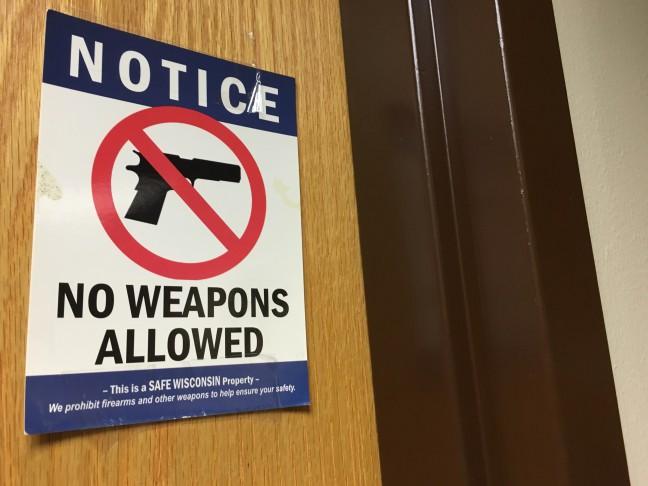Wisconsin private businesses that do not allow firearms could be liable for gun-related violence that occurs on their premises, if a GOP-sponsored bill becomes law.
The Disarmed Citizen Compensation Act, which Rep. Bob Gannon, R-Slinger, proposed June 23, would issue fines of up to $1,000 if anyone sustains gun-related injuries on a premises with signs that state no firearms are allowed. Jeff Nass, owner of Nass Consulting, said this makes businesses responsible for the security of patrons, since patrons are not allowed to bring in firearms to defend themselves.
Under Wisconsin’s Concealed Carry Law, university buildings and government and state-controlled buildings, including schools and police stations, are required to post signs that disallow both concealed and visible firearms, Nass said. He said government buildings that members of the public frequent should allow firearms and said this bill could be a step toward encouraging that.
“Places like town meeting halls and places where you go pay taxes should allow [firearms] because they are owned by the people,” Nass said. “I can’t even go pay taxes because I’m not allowed to carry [firearms] in there.”
Other establishments such as private businesses and residential units are not required to post signs disallowing firearms, but can if they wish to. Nass said Wisconsin’s Concealed Carry Law protects businesses that do allow guns on their property from being liable for gun violence.
One Wisconsin Now deputy director Mike Browne said in an email to The Badger Herald that Gannon’s proposal would allow guns in places where they should not be like schools, hospitals and private businesses.
“His proposal is sheer lunacy and isn’t going to make anyone safer,” Browne said. “What it would do is perpetuate a cycle of gun violence that has reached appalling proportions.”
Rep. Terese Berceau, D-Madison, said Gannon’s bill would exert too much control on businesses, which would make it impossible for them to make their own choices about allowing firearms. Businesses wishing to put signs disallowing firearms might be forced to not do so because of the risk of added liability, she said.
Arya Macvilay, manager of Rising Sons Deli on State Street, said the bill seems “pretty absurd” to him. Macvilay’s parents own the restaurant and chose to put a sign disallowing firearms because guns are considered inappropriate in their culture. He said they will most likely keep the sign even if the bill becomes law.
Berceau said the bill would only add to the fear stemming from public gun violence. She said the lawmakers behind this bill are not paying attention to those who are afraid of guns or were victims of gun violence and do not want such a law. She said she does not believe even Wisconsin Republicans will support this bill because of its extreme nature.
“In this day and age there’s so much gun violence and people are afraid to go to the mall, movie theaters or schools,” Berceau said. “Mothers are freaked out about sending kids to school and [Gannon] thinks there should be more guns.”
Some restaurants like DLUX, located on Martin Luther King Jr Boulevard, do not have a sign and allow firearms as long as a concealed carry permit is presented. DLUX’s manager Josh Easland said the restaurant should not be liable even if it did have the sign disallowing firearms because it is not the business’ fault.
“It is frustrating to think that we’d be liable if someone else used a gun,” Easland said.
Nass said Gannon’s bill could be helpful in catching those businesses that post the signs “illegally,” which means that they either have too small a sign or place the sign where no one can see it. He said some businesses do this so that they do not drive away customers who want to conceal carry.
The bill will be formally introduced in the next legislative session, which will begin in January 2017.
Rep. Bob Gannon did not respond to a request for comment.


